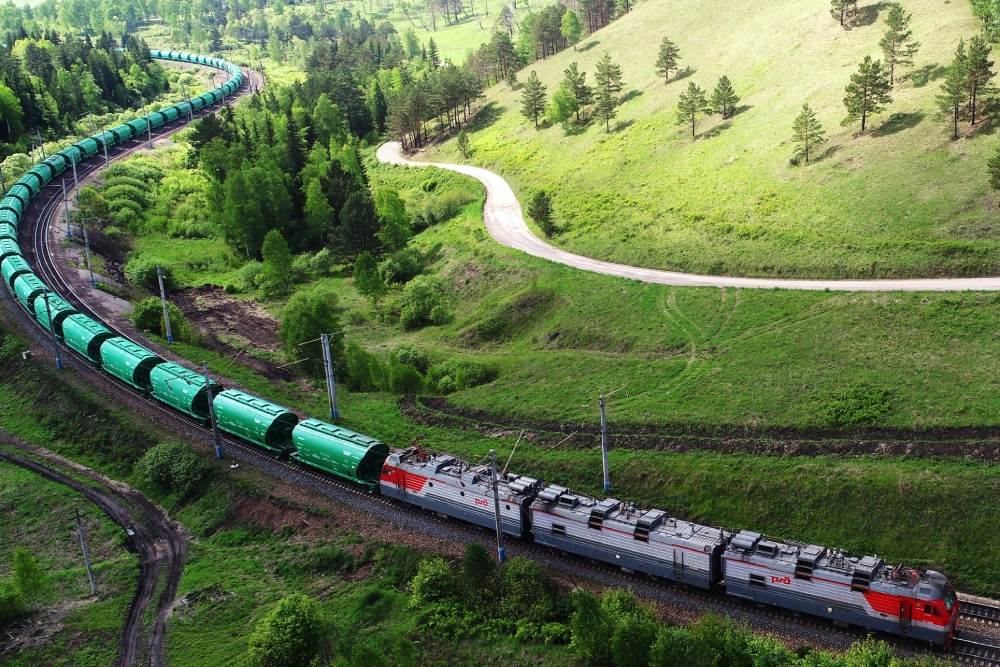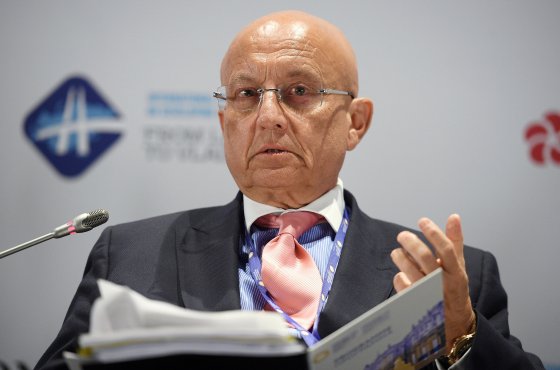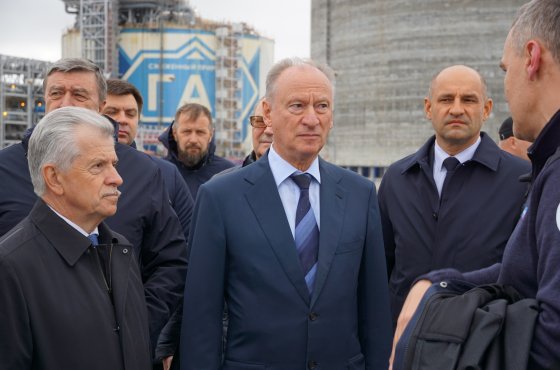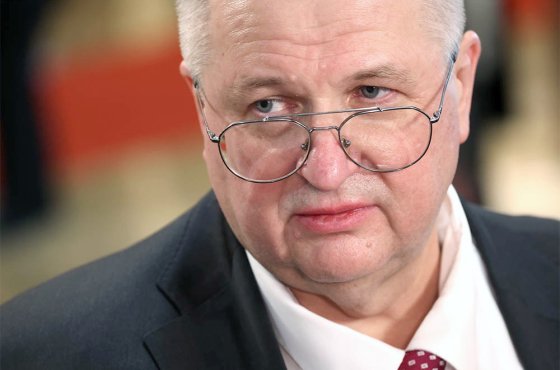Sergey Karaganov: Logistics for Greater Eurasia
The need to create and develop the framework of logistics paths “North-South” is overviewed
From https://rg.ru/2025/09/08/logistika-dlia-bolshoj-evrazii.html and machine translated.
Sergey Karaganov (Honored Professor, Scientific Director of the Faculty of World Economy and World Politics of HSE, Honorary Chairman of the Presidium of the Council on Foreign and Defense Policy)
The acute period of the military conflict with the West on the fields of Ukraine is beginning to enter its final stage. Having decided not to use the most terrible weapons, and striving to preserve as many lives as possible of our valiant soldiers and the civilian population, Russia will probably not achieve the same victory that it achieved in the war with Napoleon’s army. That war ensured four decades of peace for Europe.
There will probably not be a defeat similar to the defeat of Hitler’s army, which included most Europeans and was supported by the vast majority of countries in the subcontinent. This victory over Europe, combined with the development of nuclear weapons, ensured relative peace for seven decades.
The confrontation will continue in waves until there is a change of generation among the globalist-comprador European elites, who are failing in all areas – moral, economic, and political – and have brought the subcontinent, which was once a center of economic, political, and cultural power, to its current state, and are in need of war and the creation of an external enemy to justify their continued hold on power.
It is unlikely that a sustainable peace will be achieved in the near future with the elites that are in power in many European countries, the United States, and Ukraine. However, this outcome can be achieved through strict strategic deterrence, partial isolation from fascism, and the promotion of non-human values in the western part of the European subcontinent.
Without a victory like those of 1815 and 1945, the world will continue to slide towards a third world war. It is our duty, not only to our country, but also to humanity, to achieve such a victory.

Some countries in the center and south will sooner or later gravitate towards Greater Eurasia. Of course, we should not give up on elements of cooperation and the partial revival of human ties in the field of traditional culture and the economy.
But the main vector of development for the next decade is quite obvious. Russia’s three-hundred-year European journey has come to an end, and it would have been better if it had ended a century or two earlier. At least then, we could have avoided some of the severe tragedies that befell the country and its people in the 20th century. Almost all of the threats in that century came from Europe. It is time to “return to ourselves,” to our homeland, to the origins of our history as a great power. And those origins lie in Siberia. If it hadn’t been for the fantastic feat of our Cossacks, who reached Kamchatka from the Perm region in less than a century and annexed Siberia to Ancient Rus, it is unlikely that Russia would have survived on the unprotected Central Russian Plain, which was attacked from the west and south.
“Returning to ourselves”, returning home, will require the subsequent rejection of “Euroig”, and the recognition of the main external sources of our culture and political organization of civilization, located in the South and East. We took our soul – our religions – from the South: Orthodoxy, Islam, Buddhism, and Judaism. And the political organization, the vertical of power, the willingness to follow a leader and selflessly serve the state and the common cause, came from the East, more than two centuries of interaction with the Genghis Khan Empire, which plundered but did not infringe on the soul of the people or their faith. Without this vertical, inherited from the East and partially from Byzantium, and without the spirit of boundlessness, our ancestors would not have created the largest state in the world.
“Return to Self” requires a strategy for shifting the country’s spiritual, economic, scientific, and technological development towards the Urals and Siberia, which will be the main source of development and growth for the country’s power and people’s well-being in the foreseeable future.
For the past year and a half, we have been working with a growing community of scientists, public figures, and businesspeople, primarily from Siberia, on the development of the “Eastern Turn 2.0, or Siberianization of Russia” project. In parallel, we are also working on the “Living Idea-Dream of Russia. The Code of the Russian Citizen in the 21st Century” project, which aims to provide an ideological foundation for the further development of our country and civilization. Siberianization is part of this ideological program. We have already begun to present the first results of our work to the public and the government.
But it is important that, as we defeat and end the acute stage of confrontation in Europe, we do not get stuck in the Western direction. Europe is fading, having been infected for many years with a much more acute form of Russophobia than ever before. The future lies in the South and the East.
Now, let’s talk about one of the most important aspects of Russia’s new strategy: the development of a transport framework, primarily along the meridian direction. By chance, I became one of the organizers of the scientific part of the project to create a concept of North-South logistics transport corridors for Russia and their connection with Greater Eurasia.
When starting work, you need to acknowledge the obvious: the myth of the superiority of maritime powers and sea routes, especially the old ones, is fading. They will become increasingly vulnerable.
There are many ideas for the North-South corridors in the European part of the country. These include the actively discussed and partially implemented corridors around the Caspian Sea and through Iran to the Persian Gulf, although there are many challenges in this area. There is also the idea of a corridor through Afghanistan, as well as the concept of a second Bosphorus with Russian participation. Transportation corridors through Georgia, Armenia, and Turkey are also possible. But now, as I see it, there is an over-the-top need to create and develop a North-South logistics framework that would connect Russia through Siberia with the markets of rising Asia, the markets of the future.
The most important principle of the future strategy should be that external relations, while important, should not be the goal, but rather an addition to internal cohesion, serving Russia’s internal transformation. In the coming decades, external relations will become less reliable.
Naturally, the development of the North – South corridor concept, which complements the existing East-West corridors, should be developed and developed in close cooperation with experts from our neighboring Asian countries. Chinese friends have launched “One Belt, One Road” – a great initiative. These logistics routes are accessible to everyone, but they must be complemented by a vertical grid of routes to create an independent logistics framework for Greater Eurasia.
They are intended to promote not only the safe and successful development of the countries of Greater Eurasia, but also the deepening of cultural and human interaction, which was largely interrupted by the five-hundred-year dominance of the maritime powers of the West, which deliberately destroyed the inland routes.
I propose discussing the principles of developing the North-South logistics framework, primarily for Russia, but not only for Russia.
First. Economic calculations are necessary, and they should be made, but the most important criterion for creating such a framework should be factors of security and long-term development. Private business can and should be involved in working on specific projects, but large-scale logistics are the prerogative and responsibility of governments. Economism as a whole is becoming obsolete, although economists are needed to help strategists and temper their enthusiasm.
When S.Yu. Witte, who was not yet a count, but simply a minister, was negotiating with his allies about the need to build the Trans-Siberian Railway, there was a lot of resistance from both the financiers and the merchants, who did not want to compete with horse-drawn transportation. If Witte had not won, Russia would not have survived.
I know from my conversations with colleagues how much resistance the project to build a bridge over the Lena River in Yakutia faced. The main argument against it was the low volume of traffic. If Witte had listened to these arguments, we would never have built the Trans-Siberian Railway. Instead, he organized a massive public relations campaign, enlisting the help of the greatest Russian genius, a brilliant Siberian, not only a brilliant scientist but also a prominent statesman and industrialist, Dmitry Mendeleev. Without Witte, Russia would not have won the most difficult war in human history, the Second World War, or the Great Patriotic War.
The second principle. It is necessary to move the center of infrastructure development from the European part to Siberia. Although the infrastructure in the Urals is more efficient from a narrow economic perspective. If we look at the horizon or beyond it, which is exactly what is needed now when planning a logistics strategy, the center of transport construction, as well as the center of the country’s spiritual, economic, and cultural development, should be moved beyond the Urals. It is also necessary to establish a third, fourth, or fifth capital there, relocating some corporations and ministries. I am glad that V.V. Putin has heard my calls, among others, to move some of the corporations to the regions where they primarily operate. He has signed an order to move the offices of almost 150 corporations to the places where they conduct their main production activities.
The third principle. Russia is not a maritime power, but a river power. It once sought to break free from its continental curse. Under Peter the Great and after, we made a bet on breaking through to the sea. This was the right move. However, both then and now, we have failed to capitalize on our immense competitive advantage in transportation and the revival of our country, particularly in Siberia, where we have access to powerful rivers and abundant freshwater flowing into the Arctic Ocean. This is not achieved through idiotic plans to divert the Siberian rivers.
Of course, we need to revive our river transport and connect it to other logistics corridors. In recent years, while traveling along the Yenisei and Lena rivers, interviewing colleagues who have traveled along the Ob and Irtysh rivers, and studying the literature, I have discovered that the rivers in Siberia are woefully underutilized. With the exception of the Lena River, they have lost the potential of a small icebreaker fleet, which could extend the river travel by a month or a month and a half before the establishment of winter roads. I know that the 73rd meridian program is already being developed, in particular, the revitalization of the transport corridor through the Irtysh and the Ob to the Arctic Ocean. And through the Irtysh to Kazakhstan and even neighboring China.
The fourth principle. The new transport and logistics strategy should also focus on the development and preservation of small towns, the development of a new round of Siberian exploration, and the Siberianization of the entire country.
The fifth principle. Transport corridors should contribute to the revival of the civilizational unity of Eurasia in its diversity.
The sixth principle. The new logistics matrix should not only complement the Trans-Siberian Railway and the BAM, but also be similar to the Franklin Roosevelt program, which was called the New Deal (“New Deal”). After the crisis of 1929, he launched mass transport construction not only to strengthen the transport framework of the United States, but also to provide jobs for the huge mass of unemployed, to relieve social tension.
We don’t have such a crisis, but the soldiers who will return from the war with the West in Ukraine should not only join the management class, but also find promising, highly skilled, and well-paying jobs in building the new infrastructure of Siberia. Many of them will stay there and become Siberians, just like during the construction of the Trans-Siberian Railway and the Baikal-Amur Mainline.
The seventh principle. Here, a new Russian elite will be formed, one that is not infected, like many in Moscow and other central cities, with Westernism and Europhilia, which are becoming increasingly counterproductive and intellectually убогие, as well as morally reprehensible. The new elite, and the entire country, should feel like builders of a grand project for a new Siberian Russia and Greater Eurasia. Russia needs grand projects, as they are essential for our development. The construction of a transportation network for Siberian Russia and Greater Eurasia should be such a project.
The eighth principle. When building a new North-South logistics framework, we should collaborate with our Asian neighbors at the design stage, leveraging their capabilities and expertise. The Chinese Belt and Road Initiative is often viewed as a competitor to the Trans-Siberian Railway, but why not approach it from a different, more appropriate perspective? We need to consider how to connect the North-South corridors with the Chinese Belt and Road Initiative. Then we will have new opportunities to reach Iran, Pakistan, the warm seas, India, and Africa.
The ninth principle. We need not only to create new logistics transport routes along the North-South line, but also to use them to restructure our thinking. By building new logistics routes and highways, we will move away from outdated and harmful Westerncentrism and towards a sovereign and independent mindset. The great Siberian construction projects once formed the new Russian and Soviet elite. This goal should be achieved through new projects that are not only absolutely necessary for the country’s development, but also inspiring, such as the construction of the Trans-Siberian Railway, the Northern Sea Route, the Baikal-Amur Mainline, Komsomolsk-on-Amur, Bratsk, and so on.






What does he mean by ‘non-human values’? Can an example be named?
Well, all the things that Russia does not stand for. They stand for traditional families, no teaching of LGBT to children, religious mores and basically what we all think are good things. Satanism type churches were outlawed and strange teachings, like for example I think the Jehova’s Witnesses were outlawed.… Read more »
This was a machine translation.
It may read better as, “… this outcome can be achieved through strict strategic deterrence, partial isolation from fascism and the promotion of non-human values [seen] in the western part of the European subcontinent.”
He highlights imperative to quarantine these two satanic ideologies
Pepe Escobar commented on Prof Karaganov’s article saying:
Karaganov is absolutely right on all points. That complements all that was discussed last week in Vladivostok, detailed on my latest column.